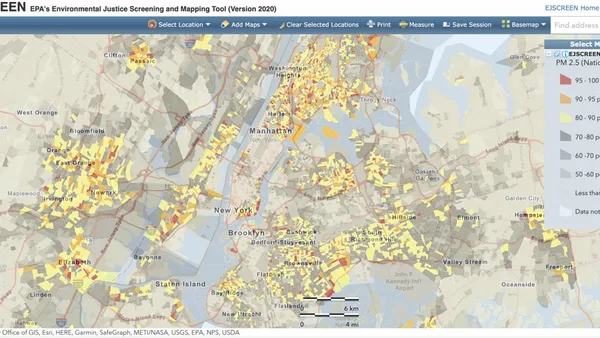Dive Brief:
- Companies annually pay on average $677,000 for reporting on the risks from climate change, according to results of a study released as the Securities and Exchange Commission pushes forward with a proposal to require detailed climate-related disclosures.
- The study includes two cost categories excluded in SEC calculations and so exceeds the agency’s average annual cost estimate of $530,000. Absent the two categories, the average annual cost for a company is $533,000, according to SustainAbility Institute at ERM, which conducted the study.
- The study “helps clarify where the market is already placing its climate disclosure bets,” according to Isabel Munilla, director of U.S. financial regulation at Ceres, which commissioned the survey. “The study’s quantitative estimates of investor status quo costs illuminate the disclosure reality on which SEC rules are being built."
Dive Insight:
SEC Chair Gary Gensler in March released an agency proposal that companies follow detailed rules for reporting on climate risk, asserting that businesses and investors will benefit from clear, uniform disclosures on the costs from global warming.
Under the proposal, companies would need to describe on Form 10-K their governance and strategy toward climate risk and their plan to achieve any targets they’ve set for curbing such risk.
Companies would also be required to disclose their greenhouse gas emissions, either from their facilities or through their energy purchases, and obtain independent attestation of their data and estimates. The proposal is subject to a public comment period ending June 17.
Invoking investor protection, the SEC on Wednesday approved a proposal that investment advisors and funds provide more information about mutual funds, exchange-traded funds and similar investments that take into account environmental, social and governance factors. The SEC will gather public comment on the proposal for 60 days.
“It is important that investors have consistent and comparable disclosures about asset managers’ ESG strategies so they can understand what data underlies funds’ claims and choose the right investment for them,” Gensler said after the approval, noting that some investment advisers and funds may overstate their ESG focus.
The ERM study, based on responses to questionnaires from 39 companies of various sizes in February and March, shows greenhouse gas emissions analysis annually costs companies on average $237,000 — the most expensive category of spending.
Under its proposal, the SEC would require some companies to report on Scope 3 greenhouse gas emissions by their suppliers, vendors and other third parties across their supply chains.
Among other expense categories, climate scenario analysis and disclosure annually costs companies on average $154,000, while the total for internal climate risk management controls is $148,000.
The SEC when releasing its proposal noted that there is “likely considerable variation in these costs depending on a given firm’s size, industry, complexity of operations and other characteristics.”
The 39 companies in the ERM study vary in market capitalization from less than $1 billion to more than $200 billion and encompass sectors ranging from healthcare and financial services to transportation and information technology.
The companies said that the work needed for climate-related disclosure offers the biggest benefit by helping them meet sustainability and climate goals, according to the study.
The companies also noted as benefits improved access to data that may sharpen business strategy; enhanced reputation with non-government organizations, nonprofits and civil society; reduced risk; and improvement in attracting and retaining employees, according to the study. They ranked “lower cost of capital” last among eight benefits.
The study looked at the costs generated from responding to climate-related shareholder proposals and from developing low-carbon transition plans and other voluntary analysis and disclosure, ERM said. The two categories were not included in the SEC cost calculations.
ERM also analyzed questionnaires from 35 institutional investors and found they annually spend $1.37 million on average to collect, analyze and report on climate data.















